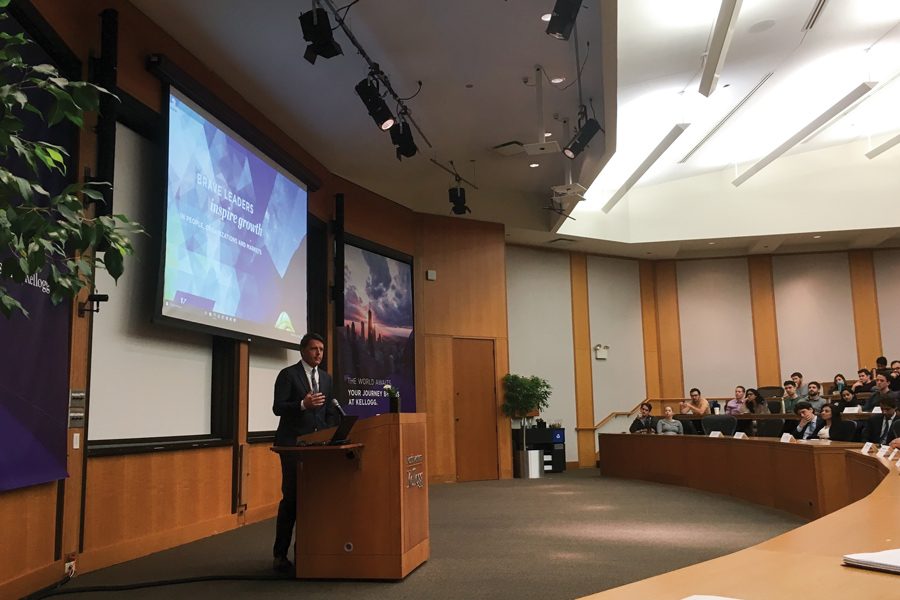Former Italian prime minister proposes strategy to defeat populism
Alan Perez/Daily Senior Staffer
Former Italian Prime Minister Matteo Renzi speaks about populism on Tuesday. Renzi discussed European politics to more than 200 people.
November 1, 2017
Brexit negotiations are well underway, and a far-right German party gained seats in the parliament. But at a keynote address Tuesday, former Italian Prime Minister Matteo Renzi said there was reason for hope.
“This time is a time of incredible and remarkable opportunity,” Renzi said. “We can win against populism … but the only way to destroy the populists’ risk is (to) create a great strategy for the future of Europe.”
Renzi shared his remarks with an audience of more than 200 people in the Allen Center at an event hosted by the Kellogg School of Management. Michelle Egner, associate director of the Kellogg speakers bureau, told The Daily the school partnered with business and public policy student groups to host Renzi.
“(The clubs) have a very strong interest in international business and the different economic and political factors that may be impacting their roles and their businesses as they move into future leadership positions,” Egner said.
Renzi discussed how European politics have weakened the European Union and said the EU is heading in a “lost direction.”
Economics Prof. Giorgio Primiceri told The Daily he agreed with Renzi’s diagnosis of populism as a threat to Europe’s economy.
Though populism’s rise is not unique to Europe, Primiceri said its implications would have a greater impact on the Euro because of its relative youth.
“Institutions within European countries are relatively strong, but institutions in the European level … are weaker because the Euro is a new thing,” he said. “If some of these populist parties were to be in charge in one of the major countries in Europe … the risk is that the general public will lose confidence in the ability of the Euro to resist the crisis.”
To protect against an EU collapse and other consequences of populism, Renzi suggested Italy and Europe tackle three specific challenges.
He called for a new economic agenda to create jobs and added that a new infrastructure plan could help expand Italy’s workforce.
Renzi had previously proposed an infrastructure plan as part of an economic transformation for Italy when he served as prime minister from 2014 to 2016. He resigned after Italian voters rejected a series of constitutional reforms he argued would clear obstacles preventing much needed economic reform. The former prime minister is in contention to reclaim his former seat in 2018, according to The Wall Street Journal.
In the future, Renzi said European countries must protect their borders and ensure the security of culture and identity.
“If we believe in a world without walls … you have to accept the importance of world identity,” Renzi said. “If we are not able to invest in your identity, you are not able to accept the dialogue, the inclusion, the tolerance. You need a strong identity to open a good dialogue.”
Renzi also said the alternative to populism is an increased democratic process, including the direct election of the EU president.
Looking forward, Renzi said the EU needs to open its mind to the future and redefine its values.
European countries strengthened their relationships in the 1950s due to steel and coal firms, but Renzi said European countries must now find new values to unite behind.
“The new coal and the new steel will be culture and innovation,” he said. “The responsibility and the commitment of universities show the future is a beautiful place.”
Email: alanperez2020@u.northwestern.edu
Twitter: @_perezalan_


